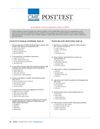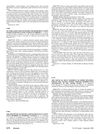
Search
for
Sort by
Research
840-870 / 1000+ results

research The Perception of Donor Gametes from Male and Female Members of Infertile Couples
Men and women in infertile couples feel using donor sperm may cause more stress and marital issues than using donor eggs.

research Rates of Polycystic Ovary Syndrome Symptoms in Relatives of Patients With PCOS
Female relatives of PCOS patients have a higher chance of showing PCOS symptoms.

research Histopathological and Topical Immunological Changes in Alopecia
Autoimmune and inflammatory processes are involved in both scarring and non-scarring types of hair loss.

research The Prevalence and Phenotypic Features of Polycystic Ovary Syndrome: A Systematic Review and Meta-Analysis
Polycystic ovary syndrome affects about 6-10% of women, with varying symptoms and the need for standardized global definitions.

research The Polycystic Ovary Syndrome: A Position Statement from the European Society of Endocrinology
The European Society of Endocrinology advises individualized long-term management for PCOS, focusing on lifestyle changes, accurate diagnosis, and treatments for associated health risks and symptoms.

research Relative Prevalence of Different Androgen Excess Disorders in 950 Women Referred Because of Clinical Hyperandrogenism
Most women referred for excess male hormone symptoms had polycystic ovary syndrome (PCOS), with other conditions being less common.

research Evidence-Based and Potential Benefits of Metformin in Polycystic Ovary Syndrome: A Comprehensive Review
Metformin helps with menstrual cycles and insulin levels in PCOS but is less effective for hair growth, diabetes prevention, and weight loss, and may improve fertility and reduce diabetes risk.

research Fetal Programming of Polycystic Ovary Syndrome by Androgen Excess: Evidence from Experimental, Clinical, and Genetic Association Studies
Exposure to too much androgen before birth might cause polycystic ovary syndrome later in life.

research Use of Cyproterone Acetate in the Treatment of Acne, Hirsutism, and Virilism
Cyproterone acetate is effective for acne but less so for hirsutism and alopecia, with some side effects and quick menstrual cycle recovery after treatment.

research The Prevalence of Polycystic Ovary Syndrome in a Normal Population According to the Rotterdam Criteria Versus Revised Criteria Including Anti-Mullerian Hormone
Adding anti-Müllerian hormone to PCOS criteria lowers the number of women diagnosed.

research Metformin or Antiandrogen in the Treatment of Hirsutism in Polycystic Ovary Syndrome
Metformin is effective for treating excessive hair growth in women with PCOS and may work better than the standard treatment in some ways.

research Effects of Sex Steroid Deprivation and Administration on Hair Growth and Skin Sebum Production in Transsexual Males and Females
Hormone treatments in transsexual individuals reduce hair growth and oil production in male-to-females and increase them in female-to-males.

research Hirsutism and Acne in Polycystic Ovary Syndrome
Lower doses of treatments for hirsutism and acne in PCOS are effective and cause fewer side effects.

research Metabolic Risk in PCOS: Phenotype and Adiposity Impact
Women with PCOS face higher risks of diabetes and heart disease, and these risks increase with obesity.

research Frontal Fibrosing Alopecia: Clinical Presentations and Prognosis
FFA is more common in postmenopausal women, can affect younger women, and may stabilize over time.

research Estrogens and Aging Skin
Estrogen therapy can reduce skin aging but has cancer risks.

research A Prospective Study of the Prevalence of Nonclassical Congenital Adrenal Hyperplasia Among Women Presenting with Hyperandrogenic Symptoms and Signs
About 2.2% of women with symptoms of high male hormones have a mild form of congenital adrenal hyperplasia, and measuring a specific hormone level can accurately diagnose it.

research Dermatological Adverse Events with Taxane Chemotherapy
Taxane chemotherapy can cause skin, hair, and nail side effects, which are often under-reported and can affect patient quality of life.

research Adult Polycystic Ovary Syndrome Begins in Childhood
Polycystic Ovary Syndrome likely starts in childhood and may be genetic and influenced by early hormone exposure.

research Neurosteroidogenesis Today: Novel Targets for Neuroactive Steroid Synthesis and Action and Their Relevance for Translational Research
New targets for making and using brain-synthesized steroids could lead to better treatments for brain disorders and alcoholism.

research A Simple Screening Approach for Assessing Community Prevalence and Phenotype of Polycystic Ovary Syndrome in a Semiurban Population in Sri Lanka
A simple screening method found that 6.3% of women in a semiurban area in Sri Lanka have polycystic ovary syndrome, with most showing menstrual irregularities.

research Short-Term Combined Treatment With Liraglutide and Metformin Leads to Significant Weight Loss in Obese Women With Polycystic Ovary Syndrome and Previous Poor Response to Metformin
Combining liraglutide and metformin helps obese women with PCOS who didn't lose weight on metformin alone to lose more weight.

research Topical Eflornithine: Efficacy in Reducing Unwanted Facial Hair Growth in Women
Eflornithine cream effectively reduces women's unwanted facial hair but hair returns if treatment stops.

research 5α-Reductase Inhibition Prevents the Luteal Phase Increase in Plasma Allopregnanolone Levels and Mitigates Symptoms in Women with Premenstrual Dysphoric Disorder
High-dose dutasteride reduces PMDD symptoms by stabilizing neurosteroid levels.

research Reproductive Dysfunction in Women With Epilepsy: Recommendations for Evaluation and Management
Women with epilepsy should be monitored for reproductive issues, which can be caused by epilepsy or its treatments, especially when using valproate.

research Androgen Dependence of Hirsutism, Acne, and Alopecia in Women
Hirsutism is more linked to high androgen levels than acne or hair loss, and a mix of hormonal tests is best for diagnosis; certain treatments can reduce symptoms.

research Androgen Excess Is the Key Element in Polycystic Ovary Syndrome
Too much male hormone is the main cause of Polycystic Ovary Syndrome.

research Diagnosis and Management of the Dermatologic Manifestations of Polycystic Ovary Syndrome
The document concludes that accurate diagnosis and personalized treatment are important for skin problems in women with PCOS.

research Obesity and Polycystic Ovary Syndrome
Obesity increases the risk of developing polycystic ovary syndrome, and weight loss can improve the condition.